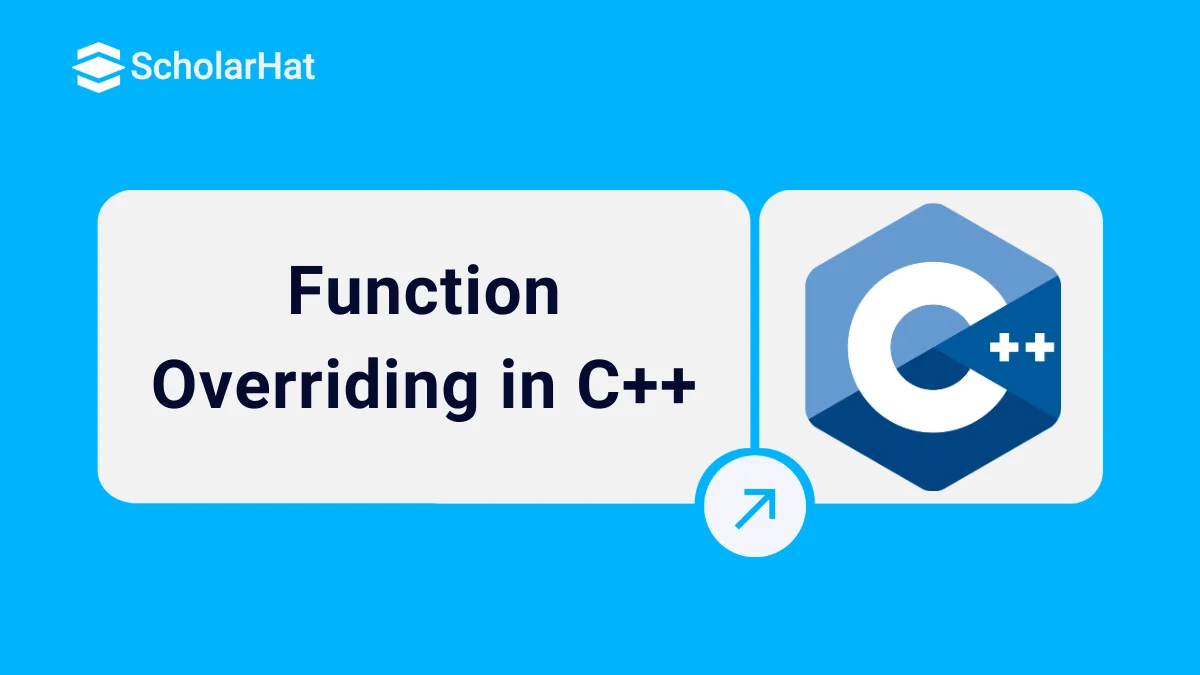06
FebFunction Overriding in C++: (Function Overloading vs. Overriding)
C++ Function Overriding: An Overview
We have seen what isfunction overloading in detail in the C++ function overloading tutorial. We have also understood C++function overriding in brief in the previous tutorial, polymorphism in C++.In this C++ tutorial, we will go a little deeper and analyze function overriding from various aspects. For practical understanding and hands-on, refer to our C++ Online Course Free.
What is Function Overriding in C++?
As seen in the inheritance in C++ tutorial, the derived classes inherit the features i.e. attributes and methods of the parent class. When you redefine any base class method with the same signature i.e. same return type, number, and type of parameters in the derived class, it is known asfunction overriding in C++.The function call by the object of the derived class invokes the derived class method instead of the base class. Thus, the derived class method overrides the base class method. Hence,
- The function in the derived class becomes the overriding function
- The function in the base class becomes the overridden function
From here onwards, we will use the termsoverriding and overridden method to refer to the same methods of derived class and base class respectively.
Syntax
class Parent{
access_modifier:
// overridden function
return_type name_of_the_function(){}
};
}
class child : public Parent {
access_modifier:
// overriding function
return_type name_of_the_function(){}
};
}
Example in C++ Online Compiler
#include <iostream>
using namespace std;
class DotNetTricks {
public:
void print() { //overridden function
cout << "Welcome to DotNetTricks" << endl;
}
};
class ScholarHat : public DotNetTricks {
public:
void print() { //overriding function
cout << "Welcome to ScholarHat" << endl;
}
};
int main() {
ScholarHat obj1;
// Call the print() function of the ScholarHat class
obj1.print();
return 0;
}
Output
Welcome to ScholarHat
We have already seen this illustration in the previous tutorial while studying the runtime polymorphism in C++. Here, what if we call the print() function from an object of the DotNetTricks class? If we do so, the print() function will not get overridden because the object of the base class will always invoke the method of the base class and not the derived class.
Make sure that you are thorough with the concepts of pointers in C++, functions in C++, Call by Value and Call by Reference in C++, and the OOPs concepts in C++. If not; go back, refer them, and then come here.
Read More - C++ Interview Interview Questions and Answers
Variations in C++ Function Overriding
- Call Overridden Function From Derived Class
Example
#include <iostream>
using namespace std;
class DotNetTricks {
public:
void print() { // overridden function
cout << "Welcome to DotNetTricks" << endl;
}
};
class ScholarHat : public DotNetTricks {
public:
void print() { // overriding function
cout << "Welcome to ScholarHat" << endl;
DotNetTricks::print(); // call overridden function
}
};
int main() {
ScholarHat obj1;
obj1.print();
return 0;
}
In this program, we have called the overridden function inside the derived class, ScholarHat itself. When you call obj1.print(), it first executes the overridden print() method in the ScholarHat class and then explicitly calls the overridden function from the base class using DotNetTricks::print(). Thus, we can use the scope resolution operator :: to access the overridden function of the base class.
Output
Welcome to ScholarHat
Welcome to DotNetTricks
- Access Overridden Function to the Base Class
Example
#include <iostream>
using namespace std;
class DotNetTricks {
public:
void print() { // overridden function
cout << "Welcome to DotNetTricks" << endl;
}
};
class ScholarHat : public DotNetTricks {
public:
void print() { // overriding function
cout << "Welcome to ScholarHat" << endl;
}
};
int main() {
ScholarHat obj1, obj2;
obj1.print();
// Access the print() function of the Base class
obj2.DotNetTricks::print();
return 0;
}
In the above C++ code, we have created two ScholarHat objects, obj1 and obj2. obj1.print() calls the overridden print() function in the ScholarHat class, while obj2.DotNetTricks::print() explicitly accesses and calls the print() function of the DotNetTricks base class in the main() function.
Output
Welcome to ScholarHat
Welcome to DotNetTricks
- Call Overridden Function Using Pointer
Example in C++ Compiler
#include <iostream>
using namespace std;
class DotNetTricks {
public:
void print() { //overridden function
cout << "Welcome to DotNetTricks" << endl;
}
};
class ScholarHat : public DotNetTricks {
public:
void print() { // overriding function
cout << "Welcome to ScholarHat" << endl;
}
};
int main() {
ScholarHat sobj1;
// Pointer of the DotNetTricks type that points to sobj1
DotNetTricks* ptr = &sobj1;
// Calls the function of DotNetTricks using ptr
ptr->print();
return 0;
}
- In the above code, a pointer of
DotNetTrickstype namedptrpoints to theScholarHatobjectsobj1 - When we call the
print()function usingptr, it calls the overridden function and not the overriding function. - The reason is even though
ptrpoints to aScholarHatobject, it is actually ofDotNetTrickstype. So, it calls the member function of theDotNetTricksclass. - Thus, the
print()function of the derived class,ScholarHatis not overriding theprint()of the base class,DotNetTricks - Here comes the need for
virtual functionsin the base class which we will see in the next tutorial, C++ Virtual Functions.
Output
Welcome to DotNetTricks
Function Overloading Vs Function Overriding
| Function Overloading | Function Overriding |
| It falls under compile-time polymorphism | It falls under Runtime Polymorphism |
| They have the same scope. | They have different scopes. |
| A function can be overloaded multiple times as it is resolved at Compile time | A function cannot be overridden multiple times as it is resolved at Run time |
| Can be executed without inheritance | Cannot be executed without inheritance |
Summary
With this, we have completed two important techniques of polymorphism,function overloading and function overriding in C++. Now we have completed almost half of the OOP concepts. The average React.js developer earns ₹15–25 LPA, but seniors earn more. Don’t wait—Enroll in our Reactjs Certification Course and unlock top-tier roles!










